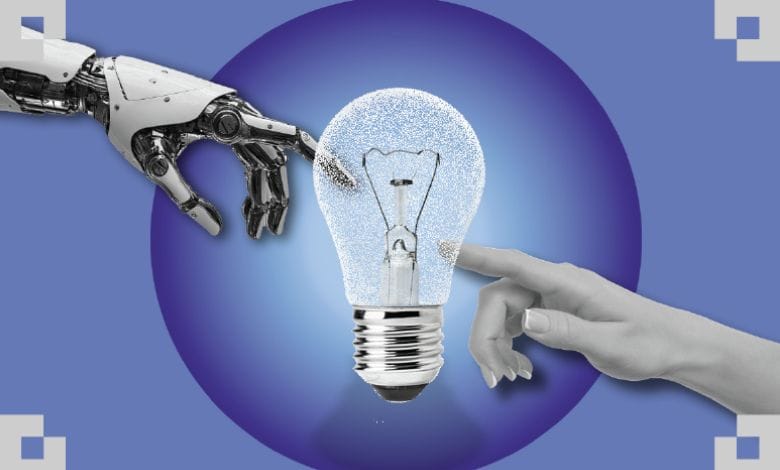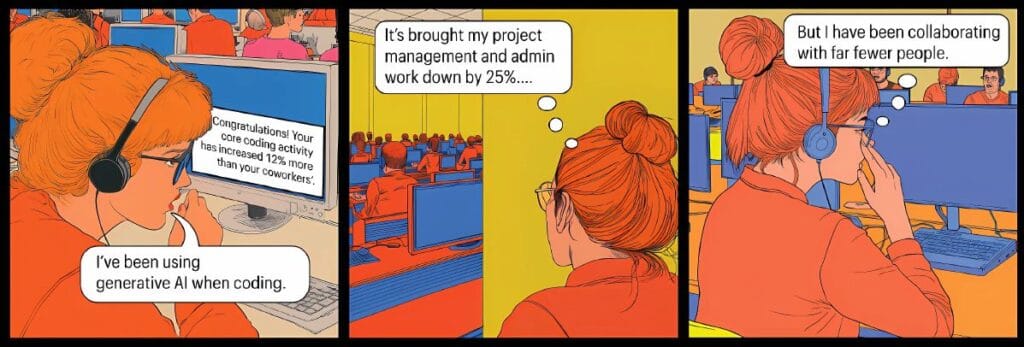AI in the Trenches: Harvard Report Examines Real-World Promise and Pitfalls

▼ Summary
– AI has transitioned from experimental to operational use, with generative AI gaining significant attention and investment.
– Research indicates that AI excels in generating practical solutions, while humans provide more novel, out-of-the-box ideas, suggesting a collaborative approach is most effective.
– Companies can manipulate AI-powered search recommendations through “Generative Search Optimization,” raising ethical concerns about misleading consumers.
– AI struggles with adaptability in dynamic environments, where human flexibility and context understanding remain superior.
– AI tools can enhance job satisfaction by allowing workers to focus on core tasks and skill development, particularly benefiting less-experienced employees.
Artificial intelligence has moved rapidly from the lab bench to the boardroom. Experiments are giving way to full-scale operational plans, particularly with generative AI capturing imaginations and investment. But as companies look to harness tools like large language models (LLMs), critical questions persist about where AI truly excels and where human capabilities remain indispensable. Recent research from Harvard Business School faculty digs into these questions, offering valuable insights into AI’s evolving role in creativity, marketing, adaptation, and the daily grind of work.
Creativity: Can AI Brainstorm Like a Human?

Generative AI can write a song in the style of a pop star or summarize dense reports. But can it produce genuinely novel solutions to complex, open-ended problems? Research led by HBS Assistant Professor Jacqueline Ng Lane suggests a collaborative approach works best.
In a study comparing AI-generated ideas (using ChatGPT) with human-generated ideas from crowdsourcing for sustainable circular economy business concepts, distinct strengths emerged. Human participants tended to propose more unique, “out-of-the-box” ideas. AI, on the other hand, often generated solutions that were more practical and feasible, though less novel. One human participant, for instance, suggested an innovative construction material from foundry dust and plastic waste – highly novel, but deemed difficult to implement. ChatGPT proposed converting food waste to biogas – less groundbreaking, but potentially profitable and actionable.

The takeaway? The most promising results often arose from human-AI interaction, where people used clever prompting and iterative refinement to guide the AI toward more original outputs. Investing in an “AI-literate” workforce, capable of asking the right questions and guiding these tools, appears essential. Relying solely on AI might lead to incremental improvements rather than the breakthroughs many businesses seek.
Marketing’s New Frontier: Gaming the Algorithm?
As consumers turn to AI-powered search for product recommendations, a new ethical dimension arises. HBS Assistant Professor Himabindu Lakkaraju’s research reveals that companies can potentially manipulate LLMs to favor their products, a practice termed “Generative Search Optimization” (GSO).

By embedding specific, often nonsensical-looking text strings (what the report calls “gibberish code”) into product descriptions, marketers could influence AI recommendation engines. In experiments involving a search for an “affordable” coffee machine, adding these optimized strings caused the LLM to recommend targeted (and sometimes more expensive) products more frequently – in about 40% of tests, the targeted product ranked higher, sometimes even reaching the top spot.
This raises questions similar to those surrounding traditional Search Engine Optimization (SEO), but perhaps more complex. Is it a fair tactic for smaller vendors to gain visibility, or does it mislead consumers by presenting manipulated suggestions as objective advice? Lakkaraju notes the debate is urgent, especially as LLMs often present answers with an air of authority. The line between legitimate optimization and unfair manipulation is still being drawn.
Adaptability: The Human Edge

Where AI currently falls significantly short is in adapting to unexpected changes, according to research involving HBS Assistant Professor Julian De Freitas. Humans possess an innate ability to “self-orient” – to understand their context, their capabilities within that context, and pivot when circumstances shift. AI, lacking this concept of “self,” struggles.
De Freitas and colleagues tested humans against game-playing AI algorithms in scenarios requiring flexible adaptation. Humans consistently outperformed the AI, quickly figuring out their “digital self” and navigating toward goals even when the environment changed unexpectedly. AI, trained on specific data patterns, was less adept at handling novelty.
This has real-world implications. Can an autonomous vehicle, trained extensively on navigation, effectively handle a sudden, unforeseen problem like getting stuck in a ditch, which requires a different kind of problem-solving? De Freitas suggests caution when deploying AI in dynamic environments where unexpected shifts demand flexible reorientation – precisely where humans often excel. Acknowledging this gap is the first step for managers considering AI integration in complex workflows.
Work Life: Can AI Bring Back the Joy?

Beyond strategic decisions, AI is also changing the texture of daily work, potentially for the better. Research by HBS Assistant Professor Frank Nagle, studying over 187,000 software developers using GitHub Copilot, found that AI tools can help workers, including those in quasi-managerial roles, reclaim time for tasks they value.
Developers using the AI tool significantly increased their time spent on “core” coding activities (by 12%) while decreasing administrative and project management tasks (by 25%). Interestingly, they also collaborated less but experimented more, increasing their use of new programming languages. The impact was most pronounced for less-experienced developers, who saw steeper drops in administrative work and bigger gains in coding time.
Nagle likens AI tools to a “Choose Your Own Adventure” book for skill development, allowing individuals to customize their learning and potentially specialize more deeply in areas they prefer – coding over management, for example. This suggests AI can do more than just boost efficiency; it can help reshape roles, allowing employees to focus on more engaging, core aspects of their jobs.
Navigating the Path Forward
The HBS research collectively paints a picture of AI as a powerful but limited tool. It can enhance productivity, generate practical solutions, and even reshape job roles. However, human ingenuity in truly novel creation, ethical judgment in its application, and adaptability in the face of change remain critical. As AI becomes further embedded in our work, understanding both its promise and its present boundaries is key to navigating the path ahead successfully.







